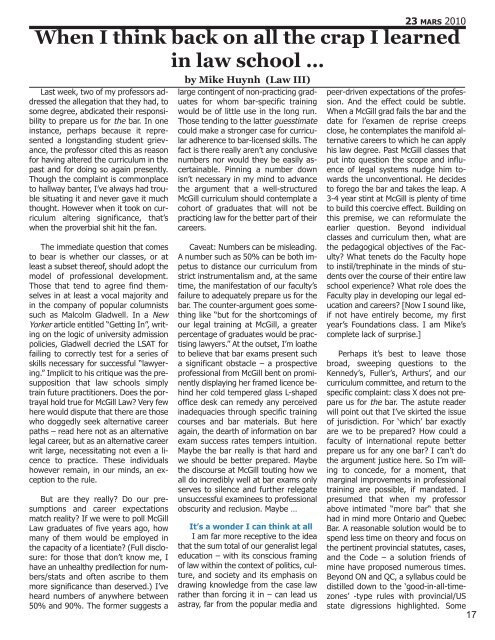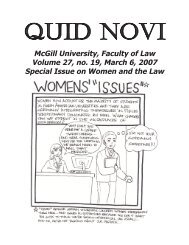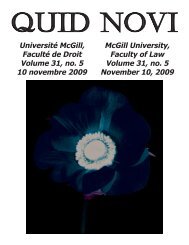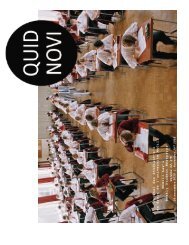March 23, 2010
March 23, 2010
March 23, 2010
Create successful ePaper yourself
Turn your PDF publications into a flip-book with our unique Google optimized e-Paper software.
<strong>23</strong> MARS <strong>2010</strong><br />
When I think back on all the crap I learned<br />
in law school …<br />
Last week, two of my professors addressed<br />
the allegation that they had, to<br />
some degree, abdicated their responsibility<br />
to prepare us for the bar. In one<br />
instance, perhaps because it represented<br />
a longstanding student grievance,<br />
the professor cited this as reason<br />
for having altered the curriculum in the<br />
past and for doing so again presently.<br />
Though the complaint is commonplace<br />
to hallway banter, I’ve always had trouble<br />
situating it and never gave it much<br />
thought. However when it took on curriculum<br />
altering significance, that’s<br />
when the proverbial shit hit the fan.<br />
The immediate question that comes<br />
to bear is whether our classes, or at<br />
least a subset thereof, should adopt the<br />
model of professional development.<br />
Those that tend to agree find themselves<br />
in at least a vocal majority and<br />
in the company of popular columnists<br />
such as Malcolm Gladwell. In a New<br />
Yorker article entitled “Getting In”, writing<br />
on the logic of university admission<br />
policies, Gladwell decried the LSAT for<br />
failing to correctly test for a series of<br />
skills necessary for successful “lawyering.”<br />
Implicit to his critique was the presupposition<br />
that law schools simply<br />
train future practitioners. Does the portrayal<br />
hold true for McGill Law Very few<br />
here would dispute that there are those<br />
who doggedly seek alternative career<br />
paths – read here not as an alternative<br />
legal career, but as an alternative career<br />
writ large, necessitating not even a licence<br />
to practice. These individuals<br />
however remain, in our minds, an exception<br />
to the rule.<br />
But are they really Do our presumptions<br />
and career expectations<br />
match reality If we were to poll McGill<br />
Law graduates of five years ago, how<br />
many of them would be employed in<br />
the capacity of a licentiate (Full disclosure:<br />
for those that don’t know me, I<br />
have an unhealthy predilection for numbers/stats<br />
and often ascribe to them<br />
more significance than deserved.) I’ve<br />
heard numbers of anywhere between<br />
50% and 90%. The former suggests a<br />
by Mike Huynh (Law III)<br />
large contingent of non-practicing graduates<br />
for whom bar-specific training<br />
would be of little use in the long run.<br />
Those tending to the latter guesstimate<br />
could make a stronger case for curricular<br />
adherence to bar-licensed skills. The<br />
fact is there really aren’t any conclusive<br />
numbers nor would they be easily ascertainable.<br />
Pinning a number down<br />
isn’t necessary in my mind to advance<br />
the argument that a well-structured<br />
McGill curriculum should contemplate a<br />
cohort of graduates that will not be<br />
practicing law for the better part of their<br />
careers.<br />
Caveat: Numbers can be misleading.<br />
A number such as 50% can be both impetus<br />
to distance our curriculum from<br />
strict instrumentalism and, at the same<br />
time, the manifestation of our faculty’s<br />
failure to adequately prepare us for the<br />
bar. The counter-argument goes something<br />
like “but for the shortcomings of<br />
our legal training at McGill, a greater<br />
percentage of graduates would be practising<br />
lawyers.” At the outset, I’m loathe<br />
to believe that bar exams present such<br />
a significant obstacle – a prospective<br />
professional from McGill bent on prominently<br />
displaying her framed licence behind<br />
her cold tempered glass L-shaped<br />
office desk can remedy any perceived<br />
inadequacies through specific training<br />
courses and bar materials. But here<br />
again, the dearth of information on bar<br />
exam success rates tempers intuition.<br />
Maybe the bar really is that hard and<br />
we should be better prepared. Maybe<br />
the discourse at McGill touting how we<br />
all do incredibly well at bar exams only<br />
serves to silence and further relegate<br />
unsuccessful examinees to professional<br />
obscurity and reclusion. Maybe …<br />
It’s a wonder I can think at all<br />
I am far more receptive to the idea<br />
that the sum total of our generalist legal<br />
education – with its conscious framing<br />
of law within the context of politics, culture,<br />
and society and its emphasis on<br />
drawing knowledge from the case law<br />
rather than forcing it in – can lead us<br />
astray, far from the popular media and<br />
peer-driven expectations of the profession.<br />
And the effect could be subtle.<br />
When a McGill grad fails the bar and the<br />
date for l’examen de reprise creeps<br />
close, he contemplates the manifold alternative<br />
careers to which he can apply<br />
his law degree. Past McGill classes that<br />
put into question the scope and influence<br />
of legal systems nudge him towards<br />
the unconventional. He decides<br />
to forego the bar and takes the leap. A<br />
3-4 year stint at McGill is plenty of time<br />
to build this coercive effect. Building on<br />
this premise, we can reformulate the<br />
earlier question. Beyond individual<br />
classes and curriculum then, what are<br />
the pedagogical objectives of the Faculty<br />
What tenets do the Faculty hope<br />
to instil/trephinate in the minds of students<br />
over the course of their entire law<br />
school experience What role does the<br />
Faculty play in developing our legal education<br />
and careers [Now I sound like,<br />
if not have entirely become, my first<br />
year’s Foundations class. I am Mike’s<br />
complete lack of surprise.]<br />
Perhaps it’s best to leave those<br />
broad, sweeping questions to the<br />
Kennedy’s, Fuller’s, Arthurs’, and our<br />
curriculum committee, and return to the<br />
specific complaint: class X does not prepare<br />
us for the bar. The astute reader<br />
will point out that I’ve skirted the issue<br />
of jurisdiction. For ‘which’ bar exactly<br />
are we to be prepared How could a<br />
faculty of international repute better<br />
prepare us for any one bar I can’t do<br />
the argument justice here. So I’m willing<br />
to concede, for a moment, that<br />
marginal improvements in professional<br />
training are possible, if mandated. I<br />
presumed that when my professor<br />
above intimated “more bar“ that she<br />
had in mind more Ontario and Quebec<br />
Bar. A reasonable solution would be to<br />
spend less time on theory and focus on<br />
the pertinent provincial statutes, cases,<br />
and the Code – a solution friends of<br />
mine have proposed numerous times.<br />
Beyond ON and QC, a syllabus could be<br />
distilled down to the ‘good-in-all-timezones’<br />
-type rules with provincial/US<br />
state digressions highlighted. Some<br />
17














